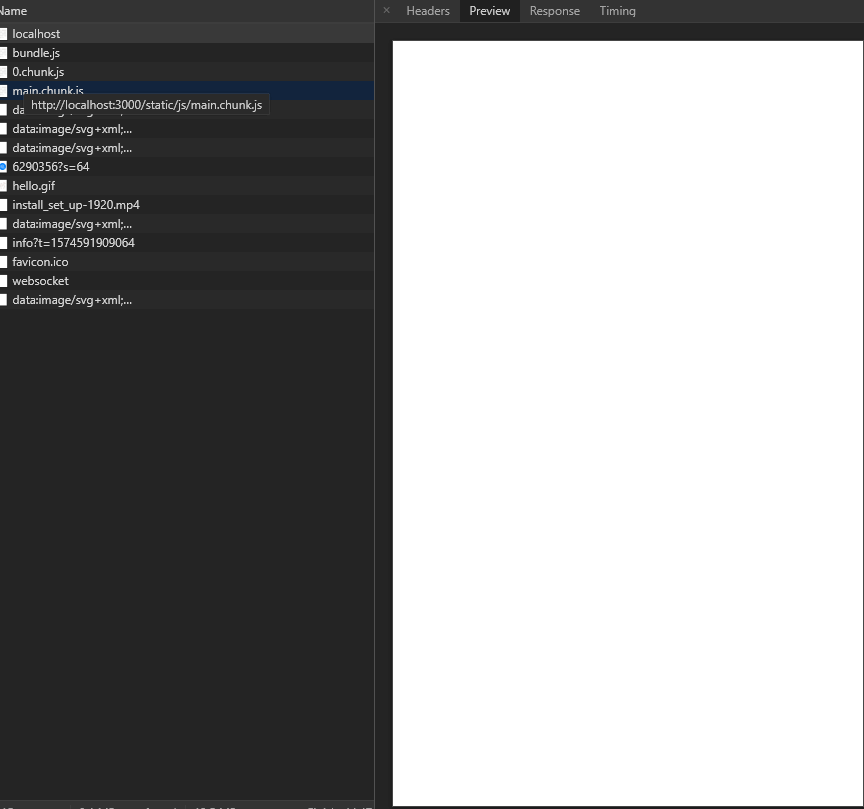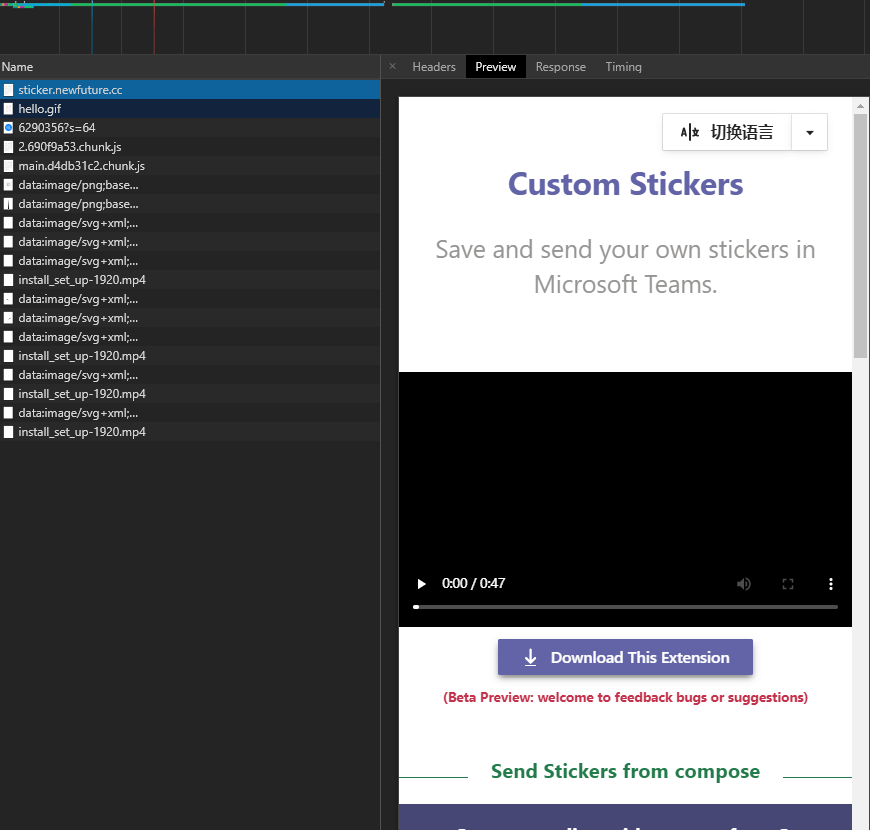什么是预渲染
预渲染(
pre-render)是提前将静态页面内容进行渲染,用来优化页面响应,SEO 以及生成静态页面.
流行的渲染工具(基于无 puppeteer 浏览器实现)
- prerender-spa-plugin webpack 插件
- react-snap 命令行工具
单页应用渲染过程
- 获取入口 html 文件
- 下载 JS 文件
- 执行 JavaScript 挂载 DOM 节点
- 渲染 UI
常见的前端框架在入口处会有类似如下的挂载操作。
将整个 APP 的内容注入到 html 的某个节点
- React
// React 入口 index.jsx
// 挂载到 #root
React.render(<App />, document.getElementById("root"));
<!-- React 入口文件 index.html -->
<div id="root"></div>
- Vue
// vue 入口js main.js
// 挂载到 #app
new Vue({ el: "#app", render: h => h(App) });
<!-- Vue入口文件 index.html -->
<div id="app">Loading...</div>
- Angular
// Angular 的更目 app module
// 注入到 app-root 节点
@Component({ selector: 'app-root'})
//...
<!-- Angular 入口文件 index.html -->
<app-root>Loading...</app-root>
在 js 加载和执行完成(第3步)之前,页面一直是空白状态(第1步的结果)。
预渲染的作用根据页面路由,在页面下载完的时候(第1步就拿到渲染的结果)。
以这个页面为例
- 未启用预渲打开 chrome 调试工具预览,显示为白屏

- 预渲染后打开 chrome 调试工具预览,渲染之后的显示界面一致

预渲染和普通渲染时间比较
截取一个 chrome 页面加载时间轴(waterfall)

| 事件 | 耗时 | 总耗时 |
|---|---|---|
| html 下载 | 637ms | 637ms |
| js 下载 | 1420ms (并行最长) | 2075ms |
| 图片下载 | 623ms | 1260ms (无预渲染为 2698ms) |
有预加载时,大概 0.6s 左右页面开始渲染,看到界面,1.2s 左右能看到图片.
无预加载时,大概 2s 左右开始渲染页面,2.7s 左右看到图片(忽略了 js 执行时间,实际更长)
预渲染 和 服务器端渲染
预渲染(Pre-render)和服务器端渲染(Server-Side-Render)都是提前渲染 HTML,加快页面呈现速度。
区别在于: 服务器端渲染更具参数动态渲染不同内容,比如不同 id 渲染出不同的详情页面给客户端, 类似于 PHP 渲染模板,Java 渲染的 JSP,或者.net 的 aspx/cshtml
而预渲染,则通常是更具不同的路由渲染出不同的页面出来,类似于 Jekyll,Gitbook 这种静态网站页面生成。
react-snap 预渲染参数
React Snap 号称是无需配置的预渲染工具。 安装完,加一行命令即可在 build 完成之后自动进行预渲染。
{
"scripts": {
"postbuild": "react-snap"
}
}
React 预渲染优化
react 提供了 hydrate 方法,用来合并已有的元素避免再次重新渲染整个root节点。(虽然hydrate是为服务器端渲染提供的,但是在预渲染的场景同样适用)
import { hydrate, render } from "react-dom";
const root = document.getElementById("root");
// render(<App />, rootElement); 换成
if (root.hasChildNodes()) {
// 在已经预渲染的情况下,执行 hydrate
hydrate(<App />, root);
} else {
render(<App />, rootElement);
}
这样当 JS 开始执行的时候,react 会之间在现有的 dom 上进行事件绑定,而不是删除现有元素重新渲染所有节点.
参数
通过在package.json中的指定"reactSnap"配置
{
"reactSnap": {}
}
是通过源码可以找到所有的配置项
{
//# stable configurations
port: 45678,
source: "build",
destination: null,
concurrency: 4,
include: ["/"],
userAgent: "ReactSnap",
// 4 params below will be refactored to one: `puppeteer: {}`
// https://github.com/stereobooster/react-snap/issues/120
headless: true,
puppeteer: {
cache: true
},
puppeteerArgs: [],
puppeteerExecutablePath: undefined,
puppeteerIgnoreHTTPSErrors: false,
publicPath: "/",
minifyCss: {},
minifyHtml: {
collapseBooleanAttributes: true,
collapseWhitespace: true,
decodeEntities: true,
keepClosingSlash: true,
sortAttributes: true,
sortClassName: false
},
// mobile first approach
viewport: {
width: 480,
height: 850
},
sourceMaps: true,
//# workarounds
// using CRA1 for compatibility with previous version will be changed to false in v2
fixWebpackChunksIssue: "CRA1",
removeBlobs: true,
fixInsertRule: true,
skipThirdPartyRequests: false,
cacheAjaxRequests: false,
http2PushManifest: false,
// may use some glob solution in the future, if required
// works when http2PushManifest: true
ignoreForPreload: ["service-worker.js"],
//# unstable configurations
preconnectThirdParty: true,
// Experimental. This config stands for two strategies inline and critical.
// TODO: inline strategy can contain errors, like, confuse relative urls
inlineCss: false,
//# feature creeps to generate screenshots
saveAs: "html",
crawl: true,
waitFor: false,
externalServer: false,
//# even more workarounds
removeStyleTags: false,
preloadImages: false,
// add async true to script tags
asyncScriptTags: false,
//# another feature creep
// tribute to Netflix Server Side Only React https://twitter.com/NetflixUIE/status/923374215041912833
// but this will also remove code which registers service worker
removeScriptTags: false
};
skipThirdPartyRequests
默认会模拟发送网络请求,如果涉及到动态数据(如需要登录),可以通过这个配置关闭这个
inlineCss
设置 true 可以压缩初次渲染的 css,如果出现异常可以关闭。
crawl
默认 react-snap 会采用爬虫的方式(寻找所有的a标签)然后渲染本站的所有链接。
但是有些场景可能只需要渲染特点的页面,可以设置 为 false 配合 include只抓取特点页面。
include
指定要爬取的页面如["/","/about.html"],则会从这两个页面路由开始生成预渲染。如果crawl设置 false 则会只生成这两页预渲染。
preloadImages
如果页面引用图片是固定的,可以将preloadImages设置为 true。
在浏览器解析 html 的 head 后会同时预取需要的图片。
样式兼容
对于使用 JSS(CSS-in-JS 使用 js 生成 css 代码)的场景(比如fluent-ui-react)。 由于样式已经提前写入 html 中,这种情况会导致部分样式二次叠加造成一下显示 bug。
比如这个 加载 动画
import React from "react";
import { hydrate, render } from "react-dom";
import { Loader, Provider, themes } from "@stardust-ui/react";
const App = () => (
<Provider theme={themes.teams}>
<Loader />
</Provider>
);
const root = document.getElementById("root");
if (root && root.hasChildNodes()) {
hydrate(<App />, root);
} else {
render(<App />, root);
}

上面的是预期效果,预渲处理后会变成下图(位置发生了偏移,造成动画异常)
removeStyleTags
react-snap 提供了removeStyleTags参数,在预渲的结果去掉<style>标签,用以兼容这些问题。
removeStyleTags 设置为true可以是最终的渲染结果一致,但是在 JS 执行前,预渲染的页面不包含 css 样式,这段时期会出现样式丢失的现象(很多时候失去了预渲染的意义)
Fela 样式兼容
Fela(State-Driven Styling in JavaScript) 是一个流行的 JS 动态渲染 style 的库,在很多 UI 组件库中有使用。
提供了rehydrate方法进行合并已有的 <style>
import { createRenderer } from "fela";
import { rehydrate } from "fela-dom";
const renderer = createRenderer();
rehydrate(renderer);
这样可以合并预渲染结果。
挂载时删除 style 标签
然而很多时候 UI 库并没有暴露出类似 rehydrate的 API,此时的 work round 就是在 React 渲染的时候删除已有的<style>标签。
const rootElement = document.getElementById("root")!;
if (rootElement.hasChildNodes()) {
// 渲染前将所有的style内容清空
// 可以根据情况限制style的范围比如 document.querySelectorAll('style[data-jss]')
document.querySelectorAll('style').forEach(s => s.innerHTML = '');
hydrate(<App />, rootElement);
} else {
render(<App />, rootElement);
}
这样在渲染前和渲染后都能样式一致。